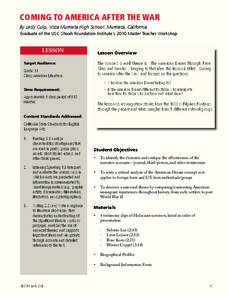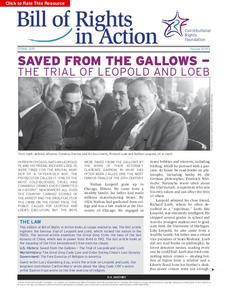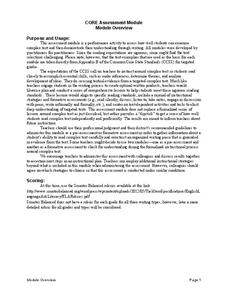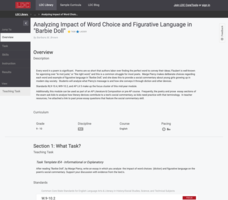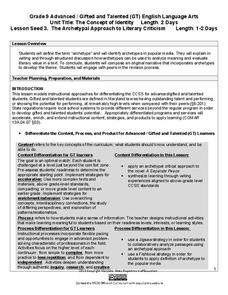Classical Academies
Story Openings
How should you begin a story? Show this presentation to give your class a few ideas. Each slide includes information about story openings and examples of certain types of story openings written by well-known authors. After showing the...
Have Fun Teaching
Story Starters
Starting at the very beginning may be a very good place to start, but it can also be very difficult for emergent writers. Help them get started by providing them with a setting, a main character, and a basic plot.
EngageNY
Launching the Performance Task: Prompt, Characters, Groups
Scholars unpack the word confession as they prepare to write confessionals based on characters from Shakespeare's A Midsummer Night's Dream. Next, they read their narratives to a small group of peers as part of a final performance task.
PBS
Write a New Year Poem Inspired by Amanda Gorman’s "New Day’s Lyric"
Here's a new take on a new year. After watching and discussing the video of Youth Poet Laureate Amanda Gorman performing her "New Day's Lyric," young poets craft poems that reflect their feelings about the past year and their resolutions...
Museum of Tolerance
My Experience with Injustice
As part of their preparation for a visit to the Museum of Tolerance, individuals are asked to write about a time when they witnessed or experienced unjust, biased, or prejudicial treatment. A great way for writers to make a personal...
National Park Service
Lesson 1: Journaling with Songs of Freedom
There's more to music than a memorable tune. The songs of those who were enslaved reveal the harsh realities of their lives. Using both songs and slave narratives, historians uncover this hidden history. The lesson incorporates a variety...
Channel Islands Film
A Time Capsule of a Lost Early California Lifestyle
After viewing The Last Roundup, a documentary that examines the transitioning of Santa Rosa from a privately owned island to a National Park, class members adopt the point of view of Tim Vail, a member of the family that once owned the...
National Park Service
Lesson 3: Resistance
During the time of slavery, resistance was a way of life for the men and women held in bondage. Using music as evidence of their fight against oppression, learners explore how enslaved people fought back. Writing prompts round out the...
University of Southern California
Coming to America After the War
As part of their exploration of the American dream, class members examine primary source materials to compare immigrant experiences of those arriving early in our country's history to those arriving in the US after World War II. To...
California Department of Education
Telling My Story
Crafting a personal statement for college admissions, job applications, or other post-high school programs does not have to be a nightmare. The "Telling My Story" packet describes the key components of successful essays and includes...
Anti-Defamation League
The Skin I’m In: Discussion Guide for Grades 8 and Up
Words can hurt! But self-esteem can blunt the impact. That's the takeaway when discussing the themes in Sharon G. Flake's powerful novel The Skin I'm In. A discussion guide leads groups through a study of this narrative of a girl who is...
National Park Service
Lesson 4: Escape
Some enslaved people decided to run for their liberation. Using lyrics of songs they sang, young historians look at these anthems of freedom. An assessment asks them to write the story of escape from the perspective of an enslaved person.
Constitutional Rights Foundation
Saved from the Gallows — the Trial of Leopold and Loeb
Was justice served for Bobby Franks? An informative article about the 1924 trial of Richard Loeb and Nathan Leopold includes an overview of the murder of Bobby Franks, the defense’s legal strategy, and excerpts of closing arguments from...
California Education Partners
Women
Alice Walker's poem "Women" provides ninth graders the opportunity to demonstrate their ability to identify how a writer's choice of syntax and diction contribute to the development of the theme of the work.
Annenberg Foundation
Exploring Borderlands
What motivated Europeans to explore the New World, and what effects did their exploration have on Native American populations? The second installment of a 16-part American Passages series prompts pupils to watch a video and read several...
Maryland Department of Education
The Concept of Identity Lesson 2: The Historical/Biographical Approach
"How does our environment shape our identity?" After researching biographical information about John Knowles and considering how these experiences are reflected in A Separate Peace, class members consider the strengths and weaknesses of...
National Center for Families Learning
The Summer Fun Summer Learning Poetry Unit
Focus on poetry this summer to enhance those comprehension, fluency, and language skills with a set of resources intended to explore different types of poetry, specifically lyric poetry. The daily activities contain differentiation ideas...
Literacy Design Collaborative
Analyzing Impact of Word Choice and Figurative Language in "Barbie Doll"
After a close reading Marge Piercy's poem "Barbie Doll," class members craft an AP®-style explanatory essay in which they analyze the diction and other figurative literary devices the poet employs to deliver her commentary on modern...
EngageNY
Final Performance Task: Becoming Visible Again
It's task time! Scholars complete the final lesson plan of the unit by completing a performance task. Readers begin in groups, working on a task card. Once complete, they move to an independent task, writing responses to a prompt about...
Annenberg Foundation
Student Voices
Whether it's an election year or not, a unit on voting patterns and political campaigns will awaken the civic pride in your high school citizens. Divided into six parts, the curriculum covers various facets of an election, including...
EngageNY
Grade 9 ELA Module 2: Unit 1, Lesson 6
It may not be 4 o'clock in the morning when you have ended these labors, but it's still time to work on textual analysis. Study the resolution of Edgar Allan Poe's "The Tell-Tale Heart" through the thematic lens of guilt and confession,...
Novelinks
Oedipus the King: Biopoem
The biopoem is a great way for instructors to get to know class members, classmates to get to know each other, and readers to flesh out their understanding of a character. Why not create a biopoem for a character from Oedipus the King?
Art Educators of New Jersey
Exploring Eric Carle’s Painted Collage
Where does inspiration come from? Where do writers get their ideas? What about visual artists? A PowerPoint and a video introduce middle schoolers to children's author and illustrator Eric Carle and how he found inspiration in the work...
Maryland Department of Education
The Concept of Identity Lesson 3: The Archetypal Approach to Literary Criticism
As class members continue their study of approaches to literary criticism, readers examine the symbolism and archetypal patterns in John Knowles' A Separate Peace, and how these parallels are used to develop a theme in the story.










